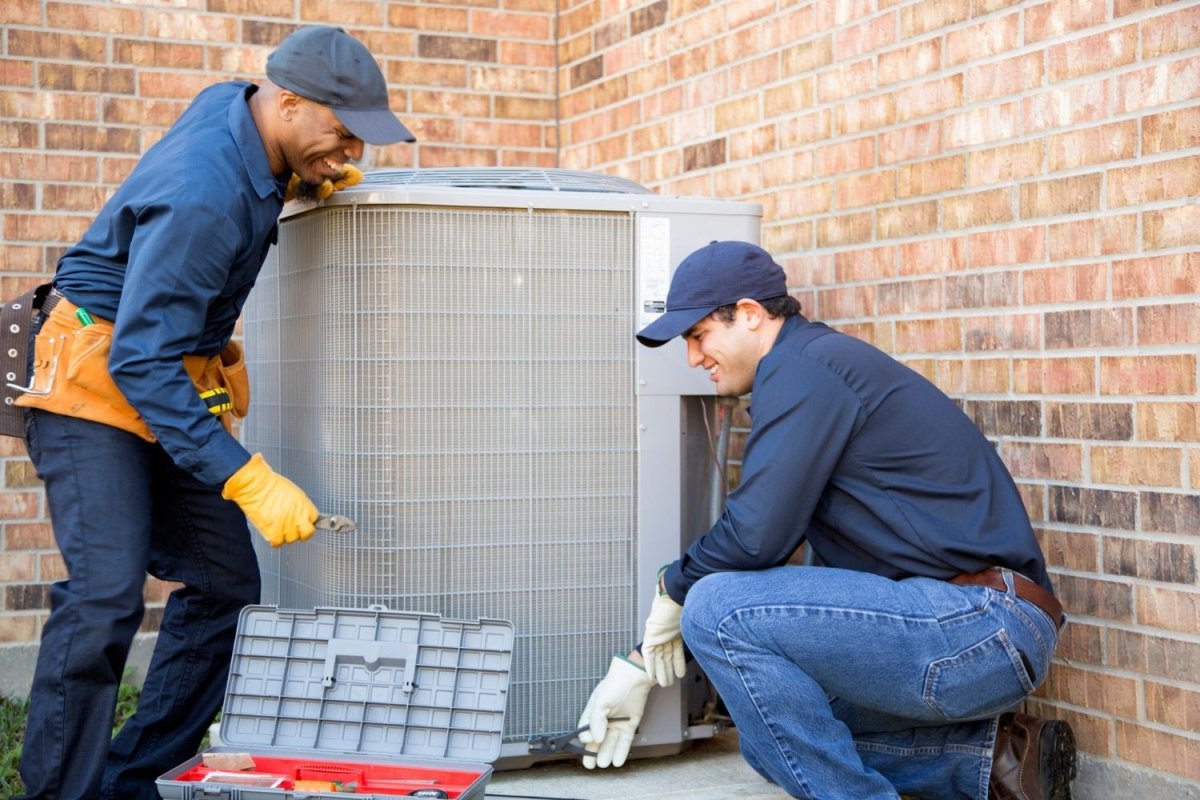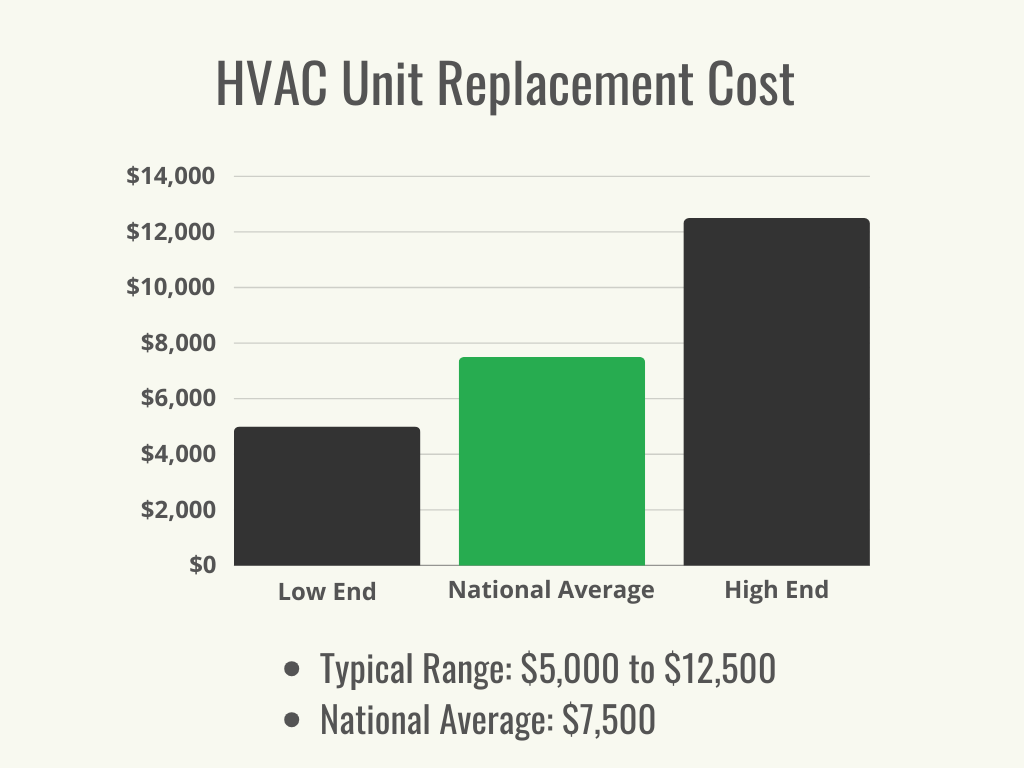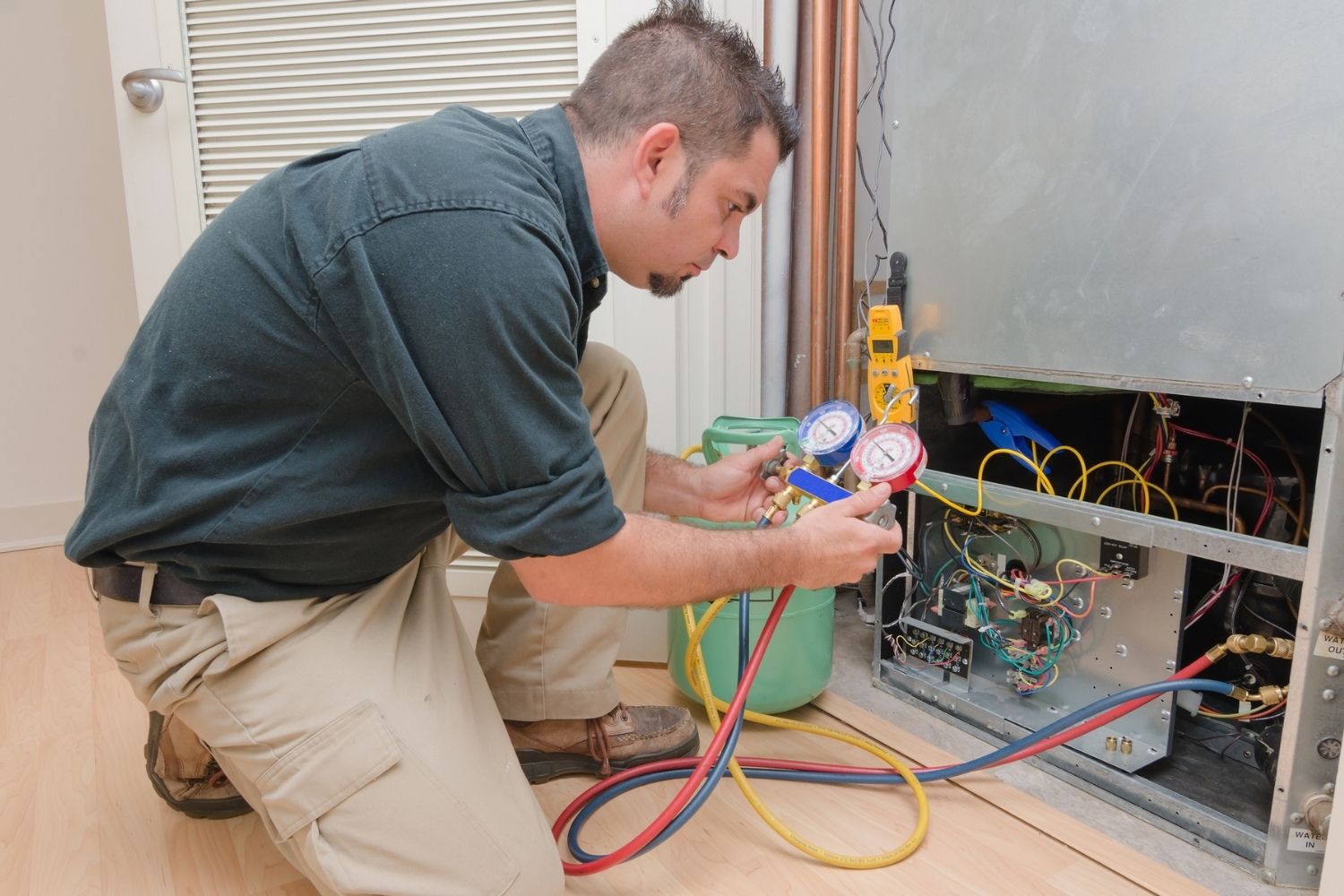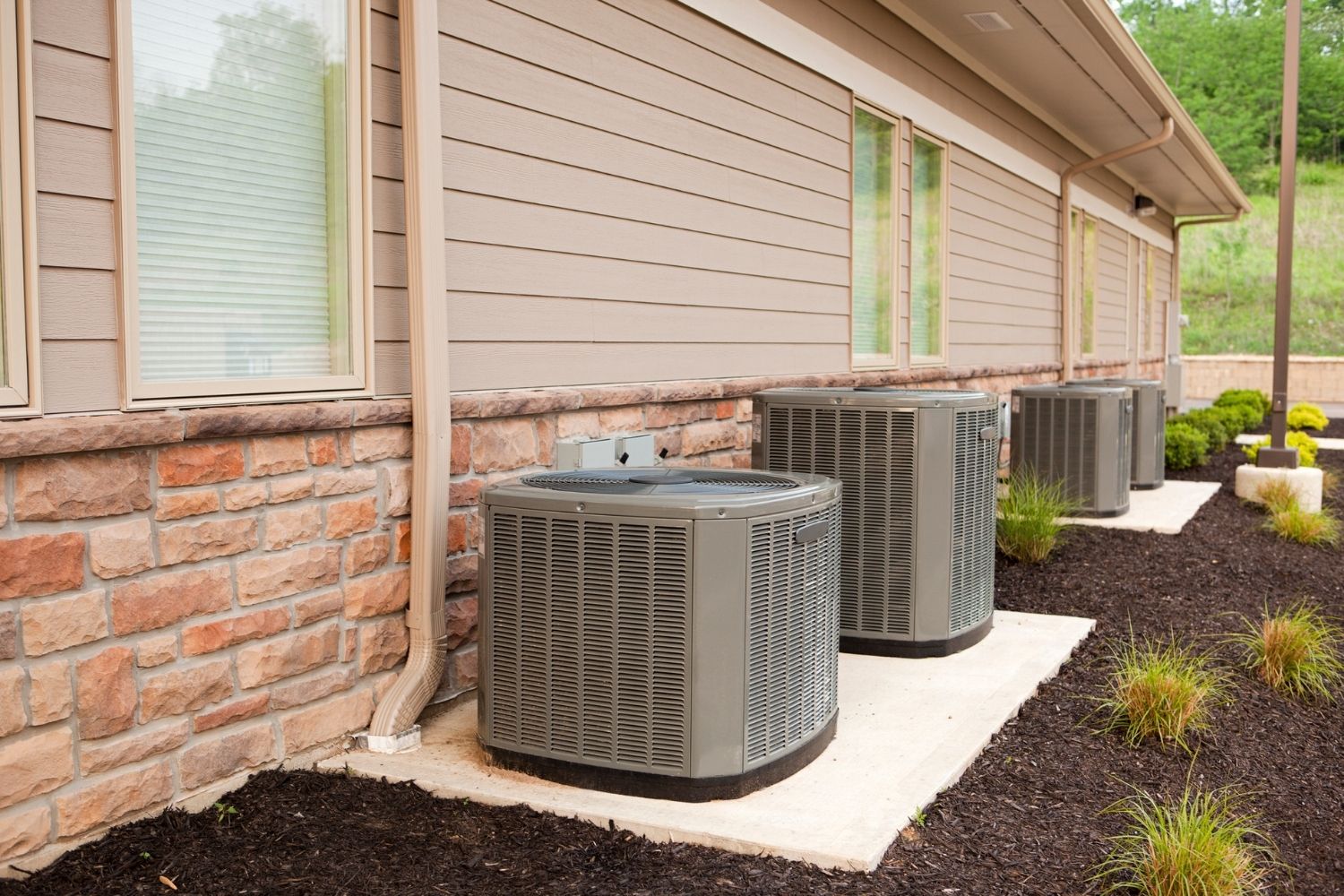

We may earn revenue from the products available on this page and participate in affiliate programs. Learn More ›
Highlights
- The typical cost range to replace an HVAC system is between $5,000 and $12,500, with a national average cost of $7,500.
- The cost could be higher or lower for an individual homeowner depending on the unit chosen, the cost of labor, the accessibility of the unit, the removal of the old unit, and the climate where the home is located.
- Homeowners may need to replace their HVAC unit if they notice higher than normal energy bills, an uneven home temperature, unusual noises, or excessive dust, or if their current system is older than 15 years.
- HVAC system replacement is a very specialized project that requires a professional, preferably one of the best HVAC companies, such as Aire Serv. Incorrectly installing a new HVAC system can lead to costly repairs or even injury.
A home’s heating, ventilation, and air conditioning (HVAC) unit helps keep it warm in the winter and cool in the summer, and it’s always circulating fresh air to eliminate allergens and dust. If an HVAC unit isn’t performing as efficiently as it once did, it may be time for a replacement. Heidi Gehring, director of residential HVAC product management at HVAC system manufacturer Carrier, says, “If the system itself is running longer or you’re seeing higher energy bills, that can be a sign that it needs to be replaced.”
According to Angi, full HVAC unit replacement costs range from $5,000 to $12,500, with the national average at $7,500. Prices depend on the size and brand of the HVAC system, the size of the house, ductwork length, and the new unit’s efficiency rating.

Factors in Calculating HVAC Unit Replacement Cost
Several factors affect the cost to replace an HVAC system. Prices can differ from the national average due to the cost of the new unit, labor prices, installation, accessibility, removal and disposal fees for the old unit, climate, and the home’s age and condition.
Unit Size and Efficiency
The greater a home’s square footage, the larger its HVAC unit will need to be for sufficient heating and cooling. AC units are typically measured by tonnage, and furnace size is determined by capacity in British thermal units (BTUs). Most ACs are between 1.5 and 3.5 tons. Furnace capacity in BTUs ranges from 40,000 to 60,000 for an 800- to 1,200-square-foot home, and up to 140,000 BTUs for a home that is 2,500 square feet or larger.
| AC Unit Size | Average Cost (Unit Only) |
| 1.5 tons | $2,000 |
| 2.5 tons | $2,900 |
| 3 tons | $3,000 |
| 3.5 tons | $3,500 |
Unit Brand
On average, the cost of an HVAC system is about $4,750, but HVAC pricing can vary depending on the brand and size of the unit. Homeowners will want to consider that a newer, more energy-efficient model may save them money on energy bills in the long run.
Labor and Permits
Labor is typically around $1,500 for HVAC unit replacement, and the price is usually included with the overall installation costs. Cost may depend on the size and complexity of the installation and may increase if the old HVAC system is being replaced with a new one or new ductwork must be installed. In most places, HVAC installation is a major enough project that it will require a building permit. Permits range in cost from $250 to $400.
Installation Location
Most HVAC systems consist of both indoor and outdoor components, with the furnace being located inside and the AC unit sitting outside the home. HVAC installation costs may increase if there are no convenient places to install one or both of these components. Indoors, for example, it may be necessary to build a utility closet around where the furnace will go, which costs $1,000 to $2,500. If outdoor space is limited, installing the AC unit on the roof will cost an additional $1,000.
Home Age and Construction
The age of a home can play a role in new HVAC system costs. For example, older homes may be less air-tight than new builds, which may mean that larger units are required to heat and cool the home. Gehring notes, “Sealing and caulking areas where cold air is coming in and warm air is leaking out can really make a difference in how efficiently the home is being heated.” Additionally, if the space where the unit is being installed is tight or difficult to access, this can increase the project cost.
Local Climate
The climate in a home’s geographic location also impacts the overall price of HVAC replacement cost. Residential furnaces typically run between 40,000 to 140,000 BTUs. One BTU is equal to the heat of one match. For homeowners who live in a hotter climate, the BTU output for cooling will increase. For homeowners who live in a dry climate, it will cost extra to add a humidifier to the HVAC unit.

Additional Costs and Considerations
When budgeting for HVAC system replacement costs, there will be additional price factors and considerations. HVAC replacement cost estimators include ductwork; adding zones, insulation, or a thermostat; additional add-ons and upgrades; furnace and air conditioner replacement; asbestos removal; and the savings from rebates.
Existing Unit Removal and Disposal
The cost of HVAC replacement typically includes the price of removal and disposal of the existing unit. This cost can run anywhere from $60 to $500. Homeowners will want to check with the HVAC professional handling their replacement on how they charge for removal and disposal.
Ductwork Installation or Replacement
HVAC duct replacement costs between $500 and $2,000. If only a section of the ductwork needs to be replaced, homeowners can expect to pay $10 to $20 per linear foot. It’s a good idea for a homeowner to replace the ductwork if they’re replacing the entire HVAC system to ensure the ductwork is free of dust and allergens and to safeguard that the system is leak-free.
Additional Zones
Adding zones to an existing HVAC system can raise the price by $2,000 to $3,000. If a homeowner installs a new system, the costs can range from $7,500 to $12,500. A zoned system uses a specific thermostat for each zone of a house. Dampers in the ductwork open and close according to the needs of each particular zone based on how much heating and cooling is needed in that area.
Insulation Installation
Insulation is typically not part of an HVAC unit installation, but those who live in an older home that is prone to drafts may want to consider it. According to Gehring, “If you feel any drafts by windows and doors, making sure to address those insulation gaps [and] keeping the home properly insulated is going to help prevent thermal loss as well as cold air infiltration.” Insulation costs can run from $1,000 to $2,100, but it can lower heating and cooling costs by 10 to 15 percent.
Insulating HVAC ductwork can help the system run more efficiently and save money on utility bills. Insulated ductwork can also help eliminate condensation and in turn, mold and mildew.
Thermostat Installation
Thermostat installation can cost from $125 to $275, depending on the type. Many HVAC professionals will include a new thermostat with the purchase of a new AC unit, heat pump, or furnace. Smart thermostats or ones that connect via Wi-Fi can run an additional $100. A programmable thermostat that regulates heating and cooling is much more efficient than a standard manual one.
Add-Ons and Upgrades
Installing a new HVAC system with extra add-ons and upgrades can increase costs by $400 to $4,000. With all the additional features, the project can take longer to complete. Some add-ons are air purifiers, a whole-house humidifier, or a whole-house dehumidifier.
| Add-On | Cost |
| Whole-house air purifier | $400 to $4,000 |
| Whole-house dehumidifier | $1,500 to $3,500 |
| Whole-house humidifier | $400 to $1,200 |
Asbestos Removal
It’s not uncommon to discover asbestos during the installation of a new HVAC system in an old house. If asbestos is found in a home, the homeowner will need to hire one of the best asbestos removal companies to extract and remove it. In some states, only a licensed professional can remove asbestos from a home. This is to ensure the safety of the home’s residents. Asbestos removal costs around $5 to $20 per square foot, or between $1,200 and $3,100.
Tax Credits
“Generally speaking, it’s always good for homeowners to consider the age of their system and then go investigate what rebates and incentive programs are out there and be a little more proactive about replacing that system,” says Gehring. Tax credits for HVAC replacement can help homeowners save up to $3,200 on the cost to buy and install an HVAC unit. Some HVAC companies offer savings on the more expensive options such as a zone system, and many local energy companies offer discounts or rebates on upgrading or replacing an HVAC system, especially if it’s an energy-efficient option.
HVAC Unit Replacement Cost by Type of Unit
Replacement HVAC costs will depend on what type, or combination of types, of units are installed. For example, a new furnace typically costs between $1,700 and $10,000 depending on the fuel type, and central air conditioning runs from $3,900 to $7,900. Other unit options include boilers, mini-splits, heat pumps, window units, and whole-house fans.
AC Unit
| AC Unit Type | Average Cost |
| Central AC | $3,900 to $7,900 |
| Ductless mini-split | $2,000 to $14,500 |
| Window AC | $150 to $550 |
| Whole-house fan | $900 to $3,600 |
The four main types of AC units are central AC, ductless mini-splits, window AC, and whole-house fans. Window AC units are the least costly as they are not whole-home systems and do not typically require professional installation. Whole-house fans are the next-cheapest option and are designed to utilize cool air from outdoors and circulate it throughout the home. A mini-split is ideal for homes where it isn’t possible to install ductwork. Mini-splits can cost anywhere from $2,000 to $14,500 depending on the number of zones it needs to cover. Finally, central AC units cost $3,900 to $7,900; they cool the whole home and can also help with reducing humidity levels.
Boiler
| Boiler Type | Average Cost |
| Electric | $1,800 to $8,000 |
| Gas or propane | $2,800 to $9,000 |
| Oil | $4,800 to $9,000 |
| Wood | $7,000 to $16,000 |
Fuel types for boilers include electric, gas or propane, oil, and wood. Electric boilers are the least costly and are also relatively simple to install and maintain. Gas and propane boilers are efficient units that provide consistent heating, as well as being relatively inexpensive to run as long as there is easy access to fuel in the region. Oil is a suitable alternative to gas or propane boilers if these fuel types are not available. Finally, wood boilers may be a practical option for those who have lots of wood on their property to use for fuel. However, these units have the highest average up-front cost.
Furnace
| Furnace Type | Average Cost |
| Electric | $1,700 to $7,100 |
| Gas | $3,800 to $10,000 |
| Oil | $3,800 to $10,000 |
Electric furnaces cost less than gas and oil furnaces, but they are most efficient for relatively warm climates. In cooler climates, oil or gas furnaces cost less to run, but the initial installation for each is between $3,800 and $10,000.
Heat Pump
| Heat Pump Type | Average Cost |
| Air source | $4,500 to $8,000 |
| Geothermal | $4,450 to $24,450 |
| Hybrid | $2,500 to $10,000 |
| Solar | $18,000 to $39,000 |
| Supplemental electric | $2,500 to $6,000 |
Heat pumps are unlike any other HVAC system as they use outdoor air and ground temperatures to heat and cool a home. Supplemental electric heat pumps are the cheapest and can provide extra warmth in regions with particularly cold winters. Hybrid units can be slightly pricier and work alongside a boiler or furnace. Air source heat pumps are typically ducted and draw warm or cool air from the atmosphere, while geothermal heat pumps use the ground or water surrounding the home as their source. Installing a geothermal heat pump costs between $4,450 and $24,450; this higher range is because it requires a significant amount of excavation. Still, solar units are the most costly as they run on solar panels. Even though the cost of heat pumps is relatively high, they are often able to pay for themselves over time due to how much they can save homeowners in energy costs.
Do I need HVAC unit replacement?
An HVAC unit typically lasts between 15 and 25 years. As units get older, they wear down and become less efficient, and the cost of HVAC repairs becomes more expensive. A few signs that it’s time to replace the HVAC system are the age of the unit, expensive utility bills, costly repairs, inconsistent temperature, strange noises, and excessive dust. If it’s unclear whether the unit needs replacement, it’s worth having an HVAC technician inspect the unit. HVAC inspection costs $250 to $400.
Aging System
The U.S. Department of Energy recommends that homeowners replace their HVAC system every 10 to 15 years. Different parts of the system age at varying rates: The heat pump and furnace last about 15 to 20 years, and the air conditioning unit lasts between 12 and 17 years. By upgrading to a newer HVAC system, homeowners can save on energy costs and reduce their carbon footprint. Additionally, aging systems break down more frequently, so replacement can also save homeowners AC repair costs and furnace repair costs.
Increasing Energy Bills
Energy bills will fluctuate with the seasons, but bills are typically similar in the same month of different years. If a homeowner notices the utility bill getting more and more expensive, their HVAC system is probably not working as efficiently as it should. Regular HVAC maintenance will help extend the life of the system, but over time some HVAC components will deteriorate.
Inconsistent Home Temperature
An aging HVAC unit will struggle to keep a consistent temperature in a home. If a homeowner notices that their home never seems warm enough in the winter or their central AC isn’t blowing cold air, their system may be nearing the end of its lifespan. Some issues that may cause inconsistent temperatures are motor damage, cracked ducts, clogged filters, a damaged or inaccurate thermostat, or low fluid levels. If the ductwork is damaged or the HVAC system is struggling to keep up with heating and cooling demands, investing in a new system will save homeowners money on utility bills.
Unusual Noises
Sometimes a failing HVAC unit will make strange squealing or grinding noises. A well-maintained HVAC system will run somewhat quietly. If a homeowner hears unusual noises coming from their HVAC unit, it’s advisable to call a professional to assess the problem.
Excessive Dust
A properly functioning HVAC unit not only heats and cools a space but also ventilates it and filters out dust, dirt, allergens, and debris. If the HVAC unit isn’t working properly, there may be a noticeable increase in dust in the house, indicating that it may be time to replace the system.

HVAC Unit Replacement: DIY vs. Hiring a Professional
Replacing an HVAC unit isn’t a DIY job, and installing the unit incorrectly can cost up to $1,000 in repairs. Not only are HVAC units highly specialized, but they’re also large, heavy, and unwieldy. Some benefits of a professional HVAC installation include professional maintenance options after installation, peace of mind in knowing the unit was installed by an expert, and the homeowner not having to do all the hard work themselves.
A few things that homeowners can do to maintain a new HVAC unit after it’s professionally installed include regularly replacing air filters; sealing any air leaks in the ductwork; clearing any debris surrounding the HVAC unit; maintaining a 2-foot clearance around the unit; replacing or adjusting the thermostat; and cleaning the evaporator coil, evaporator trap, and drain pipe with a garden hose. Some localities may also require a permit for an HVAC unit installation. A professional installer will be able to navigate the paperwork if it’s needed in the homeowner’s area.
How to Save Money on HVAC Unit Replacement Cost
While the average cost of HVAC replacement is $7,500, the additional costs associated with the project can quickly add up. One way to save on HVAC unit replacement costs is to buy the cheapest option, but there are other ways to save without compromising on quality.
- Get multiple estimates. Get at least three quotes from reputable HVAC professionals in your area, and choose the one that’s right for you.
- Do your research. If you get an estimate that is considerably lower than all the rest you’ve received, use caution. Most times the companies that offer the lowest rate may not be licensed or insured. Estimates from reputable companies will be similar to one another.
- Consider a home warranty. Home warranty policies cover HVAC and other whole-home systems. Homeowners may want to check out the best home warranties for HVAC from providers such as American Home Shield and AFC Home Club for savings on HVAC unit repair and replacement costs.
- Look for rebates and tax breaks. Many HVAC unit manufacturers offer rebates on specific models or at certain times of the year. If you install an HVAC unit that’s energy efficient or items that use renewable energy such as a geothermal heat pump, solar panels, or a solar-powered water heater, you may be eligible for a tax credit.
- Get the right size. Installing an HVAC unit that is too large for your home will increase the price by $300 to $400 per ton of cooling. HVAC unit size refers to the capacity or output that’s typically set at tons or BTUs. If the system is too small, it will run constantly to maintain the correct temperature, which will drive up energy costs.
- Choose experience. Look for an HVAC company that has experience with both commercial and residential installations. Those are the companies that have the most experience and knowledge.
If paying out of pocket for HVAC unit replacement isn’t immediately feasible, it’s worth looking into financing options. For example, home equity loans allow homeowners to make improvements and upgrades using the equity in their home as collateral. Homeowners can look into the best home equity loans from U.S. Bank, Flagstar, and others to find a lender that is the best fit for them.
Questions to Ask About HVAC Unit Replacement
Asking a professional the right questions about HVAC unit replacement costs can minimize miscommunication, save money, and get the desired results.
- How long have you been in business?
- Are you licensed and insured? Will you provide proof?
- How many employees will be working on the projects, and do you have workers’ compensation?
- Do you have referrals?
- Will you fill out and submit warranty, rebate, and other paperwork for me?
- What size HVAC system do I need?
- Will my thermostat need to be relocated?
- Will any ductwork need to be installed/moved?
- Do I need a zone system in my home?
- Does the HVAC system qualify for a tax credit?
- How efficient is the new HVAC system?
- Will my quote include the cost of removing the old system?
- What kind of maintenance do you recommend?
- How long will the new system last?
- Do you test air ducts for leakage?
- Do you offer a service plan?
- What type of warranty do you offer?
FAQs
Deciding on a new HVAC unit while staying within a budget can be a daunting process. Learning the answers to some frequently asked questions about HVAC unit replacement costs can help guide homeowners in their decisions.
It’s recommended that homeowners replace their HVAC system every 15 years. Well-maintained units may last as long as 20 years. HVAC service costs $75 to $200 on average and can greatly extend the life of the unit.
If the unit is relatively new or it’s still under warranty, the manufacturer may supply another internal unit that is compatible with the external unit. If the home has an older HVAC unit, it’s recommended to replace the entire unit to ensure the condenser is compatible and to confirm that the system is not using the banned R-22 refrigerant.
The cost to replace an HVAC unit for a 2,000-square-foot home is around $3,500. If a homeowner just wants to purchase an air conditioning unit, the cost will be considerably less.
Most HVAC systems last between 25 and 20 years. Factors such as maintenance, climate, and system type can all affect the unit’s lifespan.
Depending on the type of HVAC unit and the size of the home, HVAC unit replacement will take around 3 to 5 days.
Angi, HomeAdvisor, HomeGuide
